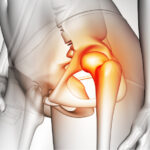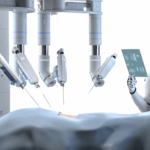The Future Of Surgical Precision
February 25, 2014
With Singapore’s ageing population, degenerative joint diseases are becoming more commonplace, and can lead to significant immobility and disability in the elderly.
A total knee arthroplasty (TKA) is a form of surgery used in the treatment of severe knee joint problems, where the symptoms of joint pain, stiffness, swelling and weakness are not effectively managed by more conservative treatment modalities, such as lifestyle changes, weight loss, physiotherapy and painkillers.
Over the last 40 years, it has proven to be a very effective surgery for patients with severe, debilitating joint arthrosis.
The success of this surgery hinges on the ability to balance the soft tissues and maintain the prosthesis in an optimal alignment, and this can be achieved by a combination of the use of innovative implant designs, more durable biomaterials and novel surgical techniques.
Robotic knee surgery is a form of computer-aided surgery (CAS) developed to decrease reliance on estimation when shaping the bone during surgery to prevent joint malalignment and provide more accuracy than the use of conventional alignment guides.
The development of CAS techniques began in Europe in the 1980s, but a revival in interest and research in this technology has occurred recently due to better understanding of knee kinematics and improvements in computer technology. The Koreans and the Japanese are currently the leaders in the application of this technology.
Orthopaedic robots can be divided into two types – haptic technology systems or full active systems like the Robodoc. Due to the development of new software supporting minimally invasive techniques, the latter can be used to perform unicondylar knee replacements, full total knee replacements, and hip replacements.
The very first robotic knee joint surgery in Singapore was performed on 15th May 2012, and since then, more than 30 cases have been performed successfully – a number that pales in comparison to the 30,000 joint replacements already done throughout the world using this technique.
How Is It Different From Conventional TKAs?
Unlike conventional methods, robotic knee surgery requires additional CT scan data of the hip, knee and ankle joints to determine the mechanical axis of the limb, and to build a three-dimensional model of the knee where “virtual surgery” is planned. This information is then fed to the machine where the bone is milled to the accuracy of 0.02mm – a feat which is not humanly possible. This helps to eliminate possible surprises such as unique implant size, and prevent wrong site surgery.
In both conventional and CAS techniques, the osteotomy cuts are performed by the surgeon using a saw like a carpenter to shave the bone for insertion of the metal knee implants. Accuracy of the cuts with conventional techniques is, at best, around 80%. With computer navigation, however, the accuracy can improve to approximately 90%. Furthermore, use of the robotic arm to perform the cuts utilises a milling technique free from excessive movement which further decreases inaccuracies from human error. The remaining margin of error thus lies in performing the osteotomy and placement of the implant, which would be reduced in the hands of experienced surgeons.
Is Robotic Knee Surgery For Everyone?
Robotic knee surgery is unfortunately not suitable for all patients. As the strength of this technique is its ability to consistently reproduce accurate cuts, complex knee deformities may not benefit from this technology. The price of the surgery may also be an issue for some, but the increased cost for the CT scan, drapes and special cutting tools seem nominal when compared to the reduced risk of complications and possible revision surgery.
Conclusion
Robotic knee surgery offers us promising new treatment options that have already been proven effective worldwide in increasing surgical accuracy and reducing the risk of joint malalignment.
Photo Credits to Curexo Inc.
Article by Dr Chin Pak Lin originally posted on Medical Grapevine
About the doctor
Doctor’s News




Doctor’s Medical Insights






